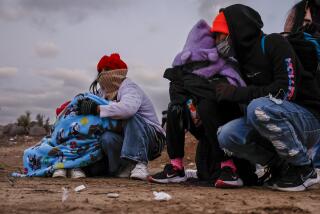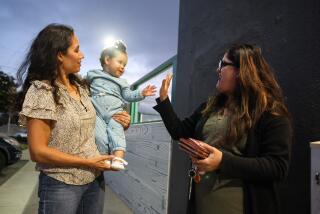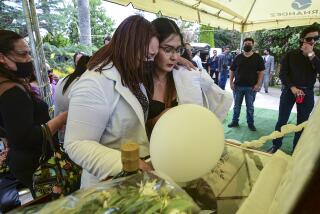A Nightingale visits Georgia field hands
- Share via
MOULTRIE, Ga. — Before she left school, student nurse Laura Meyer’s friends warned her of what might lie ahead. She wrote the warning in her diary: “Be prepared--they are dirty people. . . . Be sure to glove up. You don’t know what you might catch.”
She did catch something. Before her two weeks were up among migrant farm workers of Colquitt County in southwest Georgia, she had it bad: a desire to help a needy, often misunderstood group of people. Her patients never arrived for treatment until after they washed the red Georgia clay from their weary bodies. They were, she said, appreciative, shy, polite. They smiled and said gracias for her help.
Meyer, 28, was one of 42 students from Georgia State University’s School of Nursing who spent 14 days in midsummer earning course credit with the Migrant Health Project, funded by the School of Nursing and the Kellogg Foundation.
For five years, students in the program have moved among the migrant labor camps, which during July house more than 6,000 workers and family members, or about one-sixth of the county population. It is one of the few such programs in the country.
Before she returned to school in Atlanta, Meyer wrote in her diary: “I like to think that to be in health care and deliver care to others one must have no prejudice, no preconceived notions, no bias. . . . Everyone deserves quality and comprehensive health care delivered by a caring human being.”
The Georgia State students, their faculty advisors and other nursing students from Waycross College and Albany State University opened morning and evening clinics. They rolled into the camps in a converted 32-foot bus, called Nightingale, outfitted with two examining rooms, a lab and a dispensary. They offered tuberculosis testing, blood-pressure screening, tetanus shots and treatments for a variety of ailments and injuries.
They treated about 650 people, most of whom would never have made it to the County Health Department, which closes at 6 p.m., or to the overworked county hospital emergency room.
When they first started, they wondered why so many of the migrants eyed the bus suspiciously and hung back. Then somebody noticed that the seal of Waycross College on the side of the bus looked similar to the emblem of the Immigration and Naturalization Service. The seal came off, and the patients started lining up.
Kim Blumer, 40, one of the few Anglo farm workers seen in the camps, approached the Nightingale one stifling evening. Swatting at the mosquitoes and gnats around her face, she asked if someone could look at a spot on her right leg. She said she was worried it might be cancer caused by long days of picking vegetables in the blazing sun.
When she exited the rear of the bus she waved a tube of suntan lotion at her daughter. A smile dug crevices in her deeply tanned face.
“They told me just to watch it for a while,” she said. “This is wonderful. Lots of people don’t have medical care. They don’t have the time, or they don’t have the insurance. This should be done everywhere.”
Other work-related problems presented to the students included rashes on arms and stomachs caused by rubbing against tobacco leaves; back pains from bending over gathering vegetables all day, stomach pains and diarrhea from eating spoiled food or drinking tainted water.
In the mornings the students set up a clinic at an elementary school for preschool testing of migrant children. Across one wall hung eye charts for vision screening. Children sat on the floor for hearing tests. At two tables blood pressure was checked, and small fingers were pricked for hemoglobin testing. Colorful stickers were offered as rewards for no tears.
Behind curtains, graduate students, all registered nurses studying for degrees as nurse practitioners, conducted head-to-toe examinations of the children. The most pervasive problem was tooth decay. At the end of the checkup each child received a small paper bag filled with a new toothbrush, toothpaste, sugar-free gum and other items.
Blainette Hanson, who heads the Migrant Health Program at the Colquitt County Health Department, said the Nightingale effort “is a treasure the students couldn’t learn in a classroom. . . . The county’s improved. The students are improved. The people they serve are improved.”
Hanson wants to continue the work the students have started. She hopes to find a trailer she can hook up to her pickup. Nothing fancy. Just something she can tow from camp to camp in the evenings.
Meanwhile, Laura Meyer has joined a large Atlanta children’s hospital. She says working with the migrant kids helped prepare her. If the university gives permission, she will return to Moultrie next summer as a volunteer.
More to Read
Sign up for Essential California
The most important California stories and recommendations in your inbox every morning.
You may occasionally receive promotional content from the Los Angeles Times.










